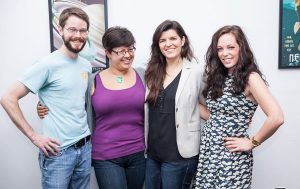
UVa graduate students! Apply by February 28 for a unique, funded opportunity to work with an interdisciplinary group of your peers, learning digital humanities skills from the experts, and collaborating on the design and execution of an innovative digital project. The 2016-2017 Praxis cohort is in full swing, thanks to generous support by UVa Library and GSAS.
Each year, the Scholars’ Lab, UVa Library’s center for advanced digital research in the humanities, runs a Praxis Program. This program provides six UVa graduate students with hands-on experience in digital humanities collaboration and project creation. Team members work to take a shared project from conception to design and development, and finally to publication, community engagement, and analysis. Praxis is a unique and well-known training program in the international digital humanities community. Our fellows blog about their experiences and develop increased facility with project management, collaboration, and the public humanities, even as they tackle (most for the first time, and with the mentorship of our faculty and staff) new programming languages, tools, and digital methods. Praxis prepares fellows to apply their own digital skills and methods to the fellowship project and to research and careers in the future.
In 2012-2013, the Scholars’ Lab joined with like-minded institutions to create the Praxis Network, made up of allied humanities education initiatives from around the world, mainly focused on graduate training, and all engaged in rethinking pedagogy and campus partnerships in relation to the digital humanities. The Praxis Network Student Directory showcases Praxis Program alumni who have traveled diverse career paths, including tenure-track teaching positions and digital humanities positions within academic libraries and research centers.
We will welcome six new, competitively-selected Praxis students in late August 2017. The Praxis fellowship replaces teaching responsibilities for the academic year. Fellows are expected to devote approximately 10 hours per week in the fall and spring semesters, to learning together and building a collaborative digital project in the Scholars’ Lab. Fellows join our vibrant community, have a voice in intellectual programming for the Scholars’ Lab, and can make use of a dedicated grad lounge.
Eligibility:
All University of Virginia doctoral students studying in any humanities and arts fields (architecture, media studies, interpretative social sciences, education, or other fields will also be considered). In general, studio or performing arts or creative writing are less appropriate applicant fields. Feel free to inquire about your disciplinary area and its fit with the Praxis program. We particularly encourage applications from women, LGBT students, and people of color, and will be working to put together an interdisciplinary and intellectually diverse team. The application process for Praxis is simple! You apply individually, and we assemble the team, through a process that includes group interviews scheduled in early March, as well as input from peers.
First step to apply: submit a letter of intent to scholarslab@virginia.edu.
Letter of Intent includes:
- the applicant’s research interests, with a title and a sentence about an example of recent work such as a thesis or essay;
- summary of the applicant’s plan for use of digital technologies in your research;
- summary of what skills, interests, methods, or experience the applicant will bring to the Praxis Program;
- summary of what the applicant hopes to gain as a Praxis Fellow.
Questions about Praxis Fellowships and the application process should be directed to scholarslab@virginia.edu
